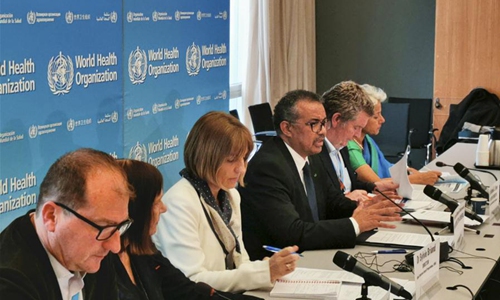US prejudice toward China limits effective coronavirus assistance

International experts including those from the World Health Organization (WHO) are scheduled to arrive in Beijing this weekend. Photo: Xinhua
US media outlets and politicians have made a number irrational statements over China not letting US experts enter the country.
US National Economic Council Director Larry Kudlow on February 13 expressed disappointment with China for not approving an invitation to a US team of experts from the US Centers for Disease Control and Prevention (CDC) to aid China in containing the epidemic, Reuters reported.
This is not the first time the US has blamed China for not inviting US medical experts to China. Since the novel coronavirus pneumonia (COVID-19) broke out, Washington has been reluctant to provide material aid to help Beijing, which makes one wonder why the superpower is so proactively keen on sending its health experts into China.
The US side may harbor the intention of collecting more first-hand information regarding to the outbreak. Due to US prejudice, the information it has received is deemed by it as lacking so-called transparency, as most information is released by China.
Some people argue that some experts with the US CDC may be intent on conducting military missions to detect China's capabilities in biochemical research. This argument that the CDC and the US military are closely linked has some validity. The agency was founded in 1946, under the name Communicable Disease Center. It was created from the Office of Malaria Control in War Areas whose primary mission was to prevent malaria and other mosquito borne diseases from being spread to US military personnel training in the US southeast. The agency's cooperation with the US military has been reported in recent years.
Kudlow also said the US is "quite disappointed" with China's response to the outbreak of the novel coronavirus pneumonia, and criticized the East Asian country for a lack of transparency.
In 2009, a novel influenza A (H1N1) virus was first detected in the US and then rapidly spread across the country and the rest of the world. The CDC estimated that 12,469 people in the US died from the virus and between 151,700 and 575,400 died worldwide. Although Washington failed to prevent and control the outbreak of H1N1, it has harshly criticized China's efforts to deal with the COVID-19, signaling another double standard.
This double standard not only reflects the US stance toward China's efforts in combating the outbreak, but in other domains as well. This is partly related to so-called American exceptionalism, which presumes that US values, political system, and history are worthy of universal admiration. It indicates that the US is both destined and entitled to play a distinct role at the world stage. This provides the US with a pretext to promote its global hegemony, set double standards and meddle in internal affairs of other countries.
When dealing with countries like China, whose ideology and political system are totally different from those in the West, the double standards imposed by the US tend to be more severe.
As the world's only superpower, Washington is supposed to shoulder more responsibility during a global health emergency. It should be providing more health-care material aid and proactively leading or organizing international cooperation. At the very least, the US should maintain neutrality toward the outbreak and show sympathy toward the people suffering from the epidemic, rather than add insult to injury.
The reason Washington has failed to do these basic things may be because of Trump's "America First" policy, which underlines the pursuit of US interests and at the expense of others. The fundamental reason for its reluctance to support during this time of need, stems from US' policy that regards China as its strategic rivalry.
China has always welcomed health experts from all countries to help China tackle the outbreak. Chinese Foreign Ministry Spokesperson Geng Shuang said on Monday, "The foreign experts in the China-WHO Joint Mission have arrived in Beijing and started their work. There are experts from the US in the mission." This collapses those groundless accusations from the US media outlets and officials.
The article was compiled by Global Times reporter Lu Yuanzhi based on an interview with Ni Feng, deputy director of the Institute of American Studies of the Chinese Academy of Social Sciences. opinion@globaltimes.com.cn